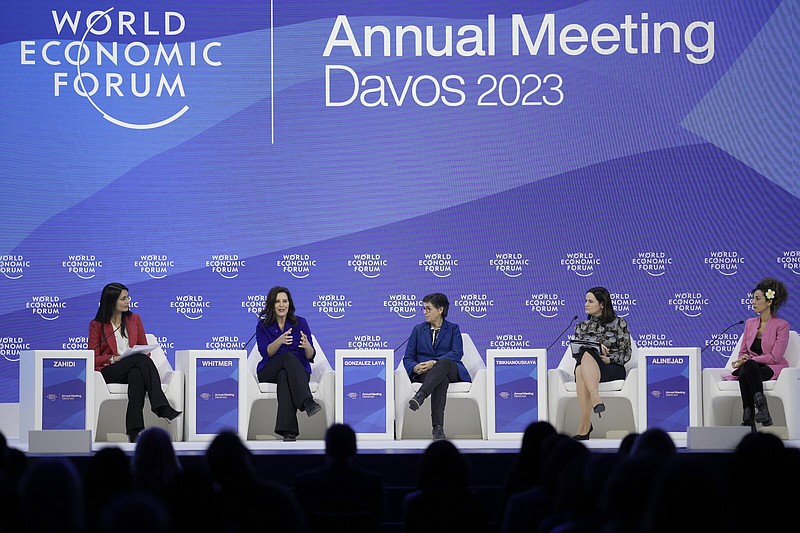DAVOS, Switzerland -- The global elite at the World Economic Forum's annual meeting in the Swiss Alps are resigned to a recession, saying it's all but inevitable -- in the United States and globally.
But they are optimistic the recession likely will be mild.
The tone is a marked shift from the last conference in May, when Russia's invasion of Ukraine and fears of economic catastrophe cast a pall on the week-long conference. Many companies scaled back plans accordingly, cutting budgets and attendee lists.
This year, they're all back -- with rosier outlooks, despite ongoing geopolitical and economic uncertainties.
"People are struggling to predict the future -- what does 2023 hold, 2024?" Jack Azagury, chief executive of strategy and consulting at Accenture, said in an interview.
"Between the war and covid and broader geopolitical events and inflation, you feel the uncertainty. But there's also a lot of positivity in the business environment. Unemployment is low, and companies are still investing," Azagury said.
Many economists attending the forum pointed to the recent slowdown in inflation, as well as a strong job market and continuing consumer spending as signs that the U.S. economy may hold up better than feared.
But there are also indications this week that new cracks may be emerging: Commerce Department data showed Wednesday that U.S. retail sales fell in December by the most in a year -- 1.1% -- as Americans reined in spending on cars, clothing and restaurants.
Also Wednesday, Microsoft became the latest tech giant to announce sweeping job cuts, saying it is cutting 10,000 employees amid fears of a global slowdown.
"There's still a lot of bleakness when it comes to prospects for recession, but there's also some optimism that it's going to be shorter and shallower than previously thought," Paul Knopp, chief executive of accounting giant KPMG, said in an interview.
"Generally speaking, there was a lot more gloominess about the economy when we were in Davos last May -- and some of what we were all worried about, we thought we'd have already seen," Knopp said.
Attendees said the mood at this week's forum was noticeably more upbeat than eight months ago. A warmer-than-expected winter in Europe has lowered energy prices across the continent and eased fears of widespread turmoil.
Many said they were also optimistic that China's reopening after years-long coronavirus-related shutdowns would help jump-start the global economy.
"We are in Davos, and if I was to describe the IMF's outlook for 2023 in one line, it would be that we have a tough year ahead, but there are signs of resilience," Gita Gopinath, deputy managing director of the International Monetary Fund, said in an address.
Although the IMF expects global economic growth to "bottom out" this year, it also predicts more sweeping economic improvements by late 2023.
Still, wild cards remain. Geopolitical turmoil -- in Ukraine, China and elsewhere -- could quickly seep into the U.S. economy.
And there is growing concern that discord in Congress will continue to prevent lawmakers from addressing the national debt ceiling after the Treasury Department began "extraordinary" accounting steps Thursday to avoid default.
Congress must pass a law raising the current limit of $31.4 trillion or the Treasury Department can't borrow anymore. Economists warn that not raising the debt limit could cause the U.S. to default, sparking a major panic on Wall Street and leading to millions of job losses.
Last week, Treasury Secretary Janet Yellen warned lawmakers that failing to act could cause "irreparable harm" to global financial stability.
But economists and corporate executives have brushed off worries about any catastrophes, because Congress ultimately has until June to strike a deal. No one in Davos appeared panicked about the U.S. debt limit.
"I don't want to prejudge what our Congress might do -- it's way too soon for that," said Knopp, before the U.S. bumped against its debt limit Thursday. "I'm an optimist by nature, but I think it's more about making sure as a business community that we put our arguments forward to Congress as to what we need to keep the American economy strong and stable."
The Davos crowd, though, has been known to misread economic signals. Critics have long maintained that many of the executives and economists attending the event are out of touch with what's happening on the ground.
In 2008, for example, during the early months of the financial crisis, C. Fred Bergsten, then director of the Peterson Institute for International Economics in Washington, declared that a global downturn at the time was "inconceivable."
Similarly, at the forum's January 2020 meeting, there was little indication that the world would soon plunge into a global pandemic and economic turmoil. Former President Donald Trump said in an interview then at Davos that the U.S. had covid-19 "totally under control." Less than two months later, Trump declared a national emergency and ordered much of the country to shut down.
This year, the hopeful mood among executives is at odds with the World Economic Forum's official stance. Among chief economists surveyed by the organization, two-thirds of respondents said a global recession is likely this year, while 78% predicted layoffs at large corporations.
"You've seen the over-optimism ... but equally, you've seen the severe-case downside," Jane Fraser, chief executive of Citigroup, said during a lunch event at the forum. "I think the general view in the States, certainly one we hold at Citi, is we expect to see a mild recession."
Information for this report was contributed by staff of The Associated Press.
